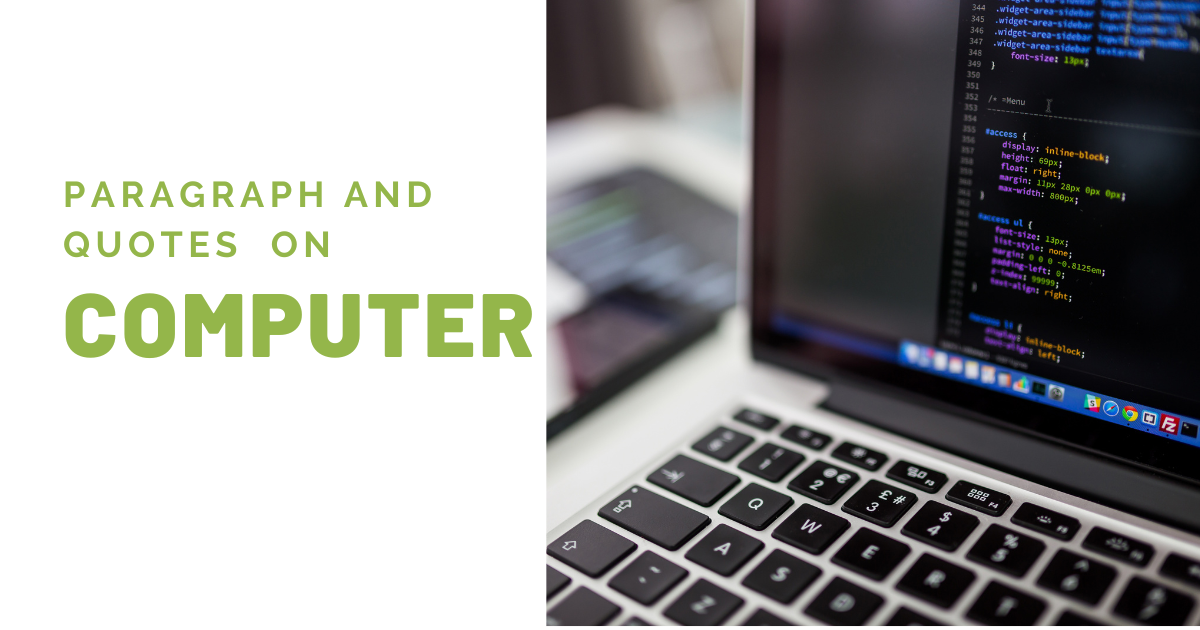Full Form of Computer
The full form of computer is a “Common Operating Machine Particularly Used for Technical, Education and Research”. It is worth noting, however, that the term “computer” has become widely accepted as a common noun to refer to the electronic devices that we use to process and store data, and the full form is rarely used in everyday conversations.
“The computer is a bicycle for our minds.” – Steve Jobs
Paragraph on Computer in 100 Words
A computer is an electronic device that can perform various operations and store data. It is an essential tool for modern life, used in a wide range of applications such as communication, entertainment, education, and business. Computers consist of hardware components such as a central processing unit (CPU), memory, and input/output devices, as well as software that allows the user to perform specific tasks. They can be used for simple tasks like browsing the internet or sending emails, as well as more complex tasks. Computers have become even more important since the advent of the internet, allowing people to connect with others all over the world, access vast amounts of information, and participate in online activities.
“The computer is incredibly fast, accurate, and stupid. Man is incredibly slow, inaccurate, and brilliant. The marriage of the two is a force beyond calculation.” – Leo Cherne
Paragraph on Computer in 150 Words
Computers have become an integral part of modern society, transforming the way people work, learn, and communicate. They have revolutionized industries such as healthcare, finance, and entertainment, making tasks faster, more efficient, and more accurate. With the development of the internet, computers have also become a gateway to a vast network of information and resources, allowing people to access knowledge from anywhere in the world.
The CPU, memory, storage devices, and input/output devices such as a keyboard, mouse, and monitor are the basic components of a computer. Computers’ versatility makes them useful tools in a wide range of fields, from scientific research to creative design. Despite their numerous benefits, computers can also present difficulties, such as cybersecurity risks and the potential for addiction. However, as technology advances, computers are likely to become even more important in daily life, driving innovation and shaping society’s future.
“Computers themselves, and software yet to be developed, will revolutionize the way we learn.” – Steve Jobs
10 Lines on Computer
- A computer is an electronic device that processes and stores data.
- It is an indispensable tool in today’s modern world, used in a wide range of applications.
- The basic components of a computer include the CPU, memory, and storage devices.
- Input/output devices like a keyboard, mouse, and monitor enable users to interact with the computer.
- Computers can run various types of software, ranging from basic operating systems to advanced applications.
- They have transformed industries such as healthcare, finance, and entertainment.
- The internet has made computers an essential tool for communication and access to information.
- Computers have made many tasks faster, more efficient, and more accurate.
- Cybersecurity threats are a growing challenge in the use of computers.
- As technology continues to advance, computers are likely to become even more integral to daily life.
FAQs
Q: What is a computer?
A: A computer is an electronic device that can perform various operations and store data.
Q: What are the components of a computer?
A: The basic components of a computer include the CPU, memory, storage devices, and input/output devices such as a keyboard, mouse, and monitor.
Q: What are the applications of a computer?
A: Computers are used in various applications such as communication, entertainment, education, business, healthcare, finance, and scientific research.
Q: What are the advantages of a computer?
A: Computers are versatile tools that can perform a wide range of tasks faster, more efficiently, and more accurately. They can access vast amounts of information and resources and connect people from all over the world.
Q: What are the challenges posed by computers?
A: Computers can pose challenges such as cybersecurity threats, potential addiction, and the need to constantly adapt to new technology.
Q: What is the future of computers?
A: As technology continues to advance, computers are likely to become even more essential to daily life, driving innovation and shaping the future of society.
“The best way to predict the future is to invent it.” – Alan Kay

